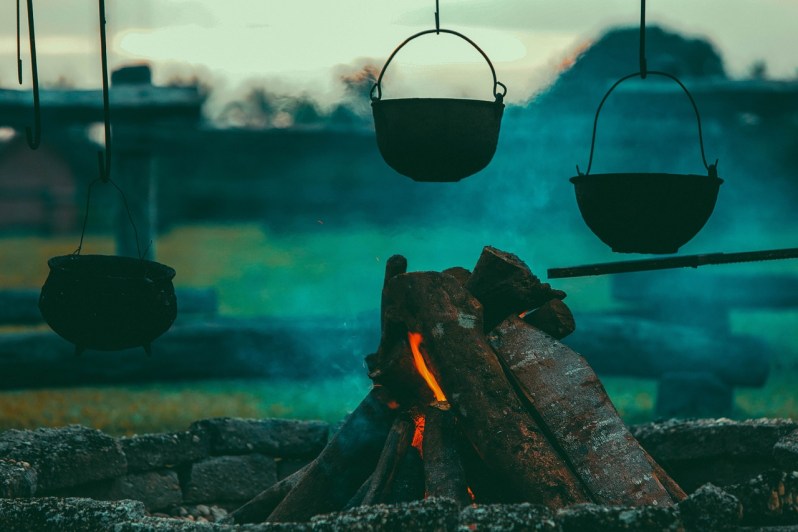If you’re tired of bland food while adventuring, you’re not alone. It can be challenging to find ways to make camp food delicious, but the good news is, it does not have to be that way! We’ve compiled a list of easy, nutritious, and versatile camping meals that you can prepare in advance to give you the energy you need for your rigorous outdoor activities. Here are some of the best camping meals you could take with you during your next outdoor adventure, as well as some tips to make it easy along the way.
Best camping meals for the hungry adventurer

Foil packet meals
If you want some no-mess, no-stress cooking, foil packet meals are the way to go. You can easily chop vegetables, marinate meats, and assemble the packets ahead of time, so you’re ready to go once you start your campfire.
Foil packets are great for camping because they can be incredibly versatile. You can experiment with different proteins, vegetables, and spices to create an excellent go-to camping meal. Consider throwing in some cooked rice, rotisserie chicken, or even cheese or pesto. When putting these packets together, use a heavy-duty foil (or double up on regular) and make sure that your packets are all sealed tightly so you don’t have any leakage.
With this cooking hack, there’s no need to bring your pots and pans. Foil packet meals don’t need a ton of heat either, so just place the packets directly onto hot embers. Avoid placing them near direct flames. Cook each packet for about 15-30 minutes depending on your protein, and flip them half way through cooking with a long pair of tongs. Then, use those tongs to carefully open the packets and check for doneness. Watch out for escaping steam, which can cause burns.
One-pot meals
If foil packets aren’t your thing, try a one-pot meal. These are great for the outdoors because they can usually feed a lot of people, but are simple to prepare and require minimal equipment. Opt for a cast iron dutch oven if you’re planning to cook over a camp fire, and make sure that it’s big enough to fit all of your ingredients inside. You can also create a pot hanger. Although a cast iron pot is heavy to pack, it’s definitely worth it.
To make things easy, chop your vegetables, marinate your meats, and measure out your spices at home. Store them in resealable bags or containers until it’s dinner time. The trick with a one-pot meal is to add the ingredients in stages based on their cooking times. For example, start with aromatics like onions, carrots, and celery, and then add your meats. After those look nice and golden, add in your liquid. Broth, water, or even canned tomatoes can take your meal to the next level.
Let everything simmer, and then carefully check if it needs any more spices. Always handle hot pots and lids with care by using gloves or a thick cloth.
Kebabs
Kebabs are great for camping because they are easy to prepare in advance, have a versatile flavor profile, and use minimal equipment to cook in the great outdoors. If you’re feeding a lot of people, you can even bring chopped vegetables and have your guests create their own! They are highly customizable, allowing you to cater to all kinds of taste or dietary preferences.
All you need is a grill grate and skewers to cook your kebabs over an open campfire. We suggest purchasing flat metal skewers, which are more durable than the wooden ones. But if the wooden ones are all you have, soak them in water for 30 minutes before putting your kebabs together, and they should hold up all right.
To make your kebabs, choose vegetables and meats that will cook evenly together. Bell peppers, onions, mushrooms, cherry tomatoes, and pineapple will go well with any number of proteins. Chop your ingredients into evenly-sized pieces at home, and marinate them in containers or resealable bags. Cook over hot coals, not flames, and turn your skewers carefully with tongs every few minutes to avoid burning. Then, let them rest for a few minutes before serving with a side of rice, pita bread, or salad. Pre-made dips like tzatziki, hummus, or a yogurt sauce will also take these to the next level.
Don’t be scared to get creative

Finally, don’t be afraid to get creative. When you experiment, you might just find your new favorite flavor! Whether you’re scaling mountains, hiking through forests, or simply enjoying a weekend by the lake, know that your campfire meals can be as satisfying as the views around you. With just a bit of planning, you can fuel your adventures with delicious meals that are easy to prep, pack, and cook.




